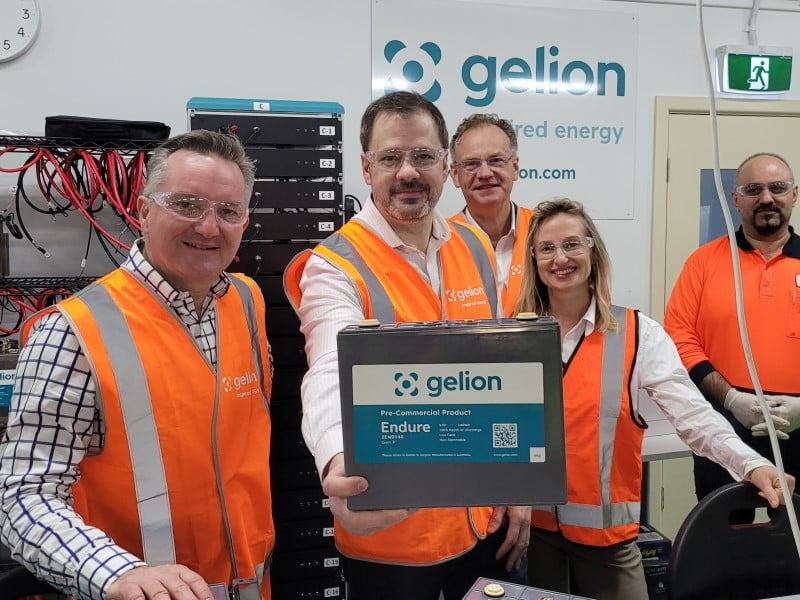University of Sydney spinout Gelion has launched its first battery storage production plant and will begin production with an annual capacity of 2MWh worth of batteries.
The production line was launched in partnership with Battery Energy and is based at its existing lead-acid manufacturing facility in Western Sydney.
Manufacturing the novel gel-based zinc bromide ‘Endure’ battery — each unit of which can store 6-12 hours of renewable energy — is said to use 70 per cent of the existing lead-acid battery production process.
The modular battery can be deployed at a small or a large scale to support renewable energy farms, in industrial settings, or on a grid scale using a containerised solution, similar to a Tesla big battery.
For a ballpark reference, the production line’s current annual capacity of 2MWh would be sufficient to support a 30MW solar plant, according to Gelion chief executive Hannah McCaughey. Future plans to scale Gelion’s production will not take place at the facility in Western Sydney.
“We absolutely have ambition to scale. We have the know how to scale, we’ve developed the industrial IP to scale, and we’re actively working on that now,” Ms McCaughey said.

Both Industry minister Ed Husic and Energy minister Chris Bowen made remarks at the launch of the facility.
“If you are a serious country, you make things, and increasingly around the world you make renewable energy and the infrastructure that supports renewable energy. There’s very little that’s more important than storing renewable energy,” Mr Bowen said.
“I’m just very delighted that this Australian know-how … is being put into place by two great companies here. The best thing is, this is just the beginning, there are many, many great advances to come.”
“The biggest thing is to celebrate our own know-how, to have faith in our ideas and to see them through is really important, and particularly when that know-how can [help address the climate crisis],” Mr Husic added.
Gelion currently has 47 employees, with Ms McCaughey telling InnvoationAus.com that finding STEM-qualified workers has not been an issue. The firm has attracted talent from 20 countries including its head of technology, which she said is a sign that Gelion is “world leading”.
The company was spun-out by principal technology advisor Professor Thomas Maschmeyer in April 2015 to commercialise non-flow zinc-bromide battery technology. Professor Maschmeyer won the Prime Minister’s Prize for Innovation in 2020.
With the Australian battery industry potentially worth $7 billion by 2030, the government has committed to producing a national battery manufacturing plan. It is currently consulting on its national electric vehicle strategy, which will consider opportunities for increased electric vehicle component manufacturing among other things.
Gelion has been listed on the London Stock Exchange Alternative Investment Market (AIM) since 2021 and is headquartered in London. Listing on AIM gives the firm access to “deep pools of capital for our type of technology”, Ms McCaughey said.
The firm’s first major capital raise was in 2016 through a strategic partnership with London-based Armstrong Capital Management, which established the Gelion UK parent company. Ms McCaughey said that Australian investors own roughly 50 per cent of the parent company. It operates in Australia through the wholly-owned subsidiary Gelion Technologies.
Gelion does not currently have manufacturing capabilities in the United Kingdom but is currently “in discussions about going global”.
“There is a heap of interest in our battery in Europe at the moment because of the high gas prices. [For some] industries their energy prices have increased fivefold and it is becoming an existential issue, so they’re very interested in buying our battery and scaling it in Europe and in the UK,” Ms McCaughey said.
The United States is also “very interesting”, particularly since the arrival of the inflation reduction act which requires batteries to have locally manufactured parts.
“We’ve had a lot of US interests ever since that announcement … so now that’s an open area of discussion for us,” she said.
When asked if Gelion had received government support on their commercialisation journey, Ms McCaughey said it had “done it all privately”. However, she argued that if Australia wants to have sovereign capability “we need government incentives and commitments”.
“We think that the [$15 billion] national reconstruction plan … is fantastic, we’re just looking forward to seeing the details … and engaging with the government further on that issue.”
Do you know more? Contact James Riley via Email.

